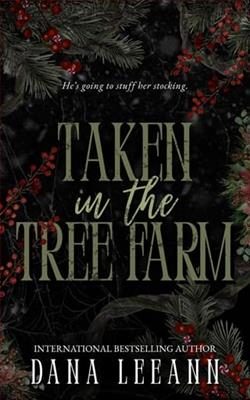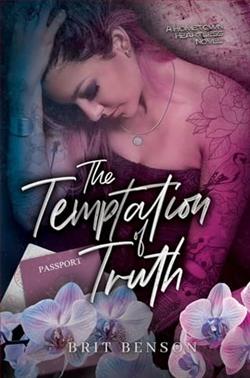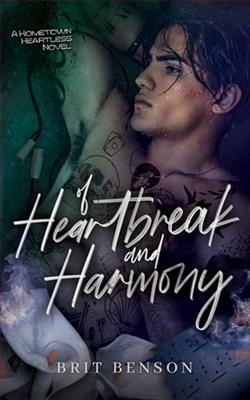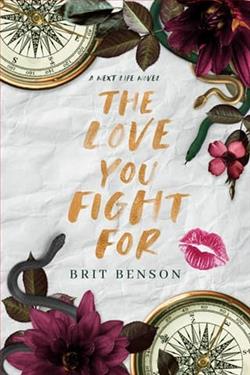Page 5 of A Talent for Murder
That night, over dinner, Martha asked Alan about the shirt. He’d looked flustered at first, eventually claiming that he had no idea how the stain had gotten there.
“You think I’m some kind of serial killer, Martha?” he’d said, raising one brow.
It was an obvious joke, but something in his tone made Martha’s flesh crawl a little bit. “Why would you say that?”
“I don’t know. Because I had blood on my shirt?”
“I mean, wouldn’t I think that maybe you’d cut yourself first? Why go straight to serial killer?”
“I was just making a joke.” He put his hands up in a gesture of surrender.
That night they watched two episodes of the current season of Outlander. Alan fell asleep halfway through the second episode, the way he always fell asleep, his eyes simply closing while he remained in his normal seated position. Martha turned the volume down and flipped over to HGTV, not because she felt like watching it, but because she wanted something mindless on while she thought. She decided to calmly appraise her situation because she kept going over the odd discussion with her husband at dinner. She told herself that if she’d married a bad man, a man who (maybe) assaulted people, he’d have had some ready-made excuse for the evidence on his shirt. As it was, he’d seemed genuinely baffled by it. Or had he? She couldn’t figure it out, and she thought, once again, that she just didn’t know him that well, despite the fact that they were married. She knew everything external about him—the way he moved and spoke and made love and ate his food—but his internal world was a complete mystery. When he lay in bed at night she had no idea what he was thinking about, and she didn’t know if that was unusual or not. Maybe everyone was the same as her, going through life surrounded by people who amounted to being little more than strangers?
Still, it bothered her. That sort of thing—not knowing—had always bothered her. Maybe it was why she’d become a librarian. When she was twelve years old, she’d given a class presentation on her favorite novel, The Westing Game, by Ellen Raskin. Afterward the teacher, Ms.Myrvoll, had asked a few questions. One of them, and Martha remembered this like it was yesterday, was whether Martha sought out other books by Ellen Raskin. She hadn’t, really. In fact, she’d hardly thought of it at all. It was the book she loved, not necessarily the author, but that night she lay in bed and thought about the question. Suddenly she not only wanted to know everything that the author had ever written, she was now determined to read it all. The next day had been a Saturday and she’d talked her mother into driving her to the library.
“That was the day you became obsessed with libraries,” her mother had said, on more than one occasion. The other thing she liked to say, used to like to say, was how Martha always had her nose in a book. It was mostly true, what her mother said, but Martha wasn’t just obsessed with books. She was obsessed with getting the whole story. How many books had this author written? What was their life like? Did they have a secret pseudonym?
A week later Alan went to another conference, this one for community college educators down in Chapel Hill, North Carolina. The weather had finally turned nice, and on Alan’s first day away, Martha walked into downtown Portsmouth to do some shopping and eat lunch at a Mexican restaurant she liked. While she was there Alan texted her a picture of himself, the hotel swimming pool sparkling in the sun behind him. He was wearing a Hawaiian shirt and wire-rimmed sunglasses. “Water’s lovely,” he wrote.
Something about that picture—since when did Alan send selfies?—made Martha feel as though a spider were skittering across the nape of her neck. Had he suddenly decided to send her updates from his trip, something he’d never done before? And if that was the case, then why? That night, after cheese and crackers for dinner, she went to her computer and decided to do the thing that she had been postponing doing since finding the shirt with the stain on it. First things first, she did a search of every email she’d gotten from Alan since they’d been in a serious relationship. He had a habit of always sending her his itinerary when he went away on a trip. It was always very formal, the subject reading “Wichita Trip” or “Chattanooga Conference” and then he’d provide details: the dates of travel; his flights, complete with links; the hotel he was staying at. It was actually a very helpful thing that he did, since Martha often found herself wondering where in the country he was at any given moment. She found a spiral notebook in one of the drawers of her desk and opened it up to a blank page, writing down a chronological history of her husband’s trips. Since shortly before they’d gotten married he’d been on twenty-three trips.
After making her list she opened up a browser window and began to search news stories. It took her three hours, but when she was done, she had written down five separate incidents.
On February4, 2018, about two months before she and Alan were married, a twenty-four-year-old prostitute named Kelli Baldwin was found bludgeoned to death in Atlanta, Georgia. That same weekend Alan was at an Atlanta trade show of high school curriculum materials.
Three months later, Bianca Muranos, a single mother and a receptionist in the Chicago area, was found dead in the alleyway behind a downtown conference hotel. Cause of death was listed as blunt-force trauma to the head. This was in May, the same weekend that a national conference on STEM education was being held at the same downtown conference hotel.
In July of that same year was the incident at Shepaug University that she knew about already. Josie Nixon, pronounced a suicide.
The fourth incident had happened at the Making Math Fun Conference, an annual event held every October in Fort Myers, Florida. That conference had actually been mentioned in the article Martha found about Nora Johnson, the victim. She had been a bartender at the hotel where the conference was taking place and had been found strangled in her car in the hotel parking lot. One of the parking attendants at the hotel had been arrested and subsequently released.
The final incident that Martha recorded, not including the recent assault on the unnamed woman in Denver, involved another young woman, Mikaela Sager, identified as a massage therapist, in San Diego on the second weekend of February, when Alan had been attending a conference for English teachers. Her body had been discovered on Mission Beach, and the earliest stories had referred to the death as being an accidental drowning while later stories referred to it as a suspicious death.
Martha read through all her notes, then, barely conscious that she was doing it, she said all the names out loud. “Kelli Baldwin, Bianca Muranos, Josie Nixon, Nora Johnson, Mikaela Sager.” She said their names again, adding, “and the woman whose name I don’t know in Denver.”
Chapter3
Martha stood and paced around the downstairs of her house, at one point scooping up Gilbert and carrying him with her. He liked to be held as long as the human doing the holding kept moving. When Martha found herself back at her desk in the living room, she stared at the list again, tempted to cross out the jumping death of Josie Nixon in Connecticut. It was an outlier, the victim being an attendee of the conference, and the death being ruled a suicide. But she decided to not cross it out in the end. That was the trip Alan was returning from when she’d watched him in the driveway, practicing his smile. That phrase echoed in her head. Practicing his smile. Why else would he have smiled that way in their driveway? Humans—real humans—don’t practice their emotions. Or maybe they do, she thought, remembering being a middle schooler and practicing biting her lower lip in the mirror because a friend had told her it was how to look sexy. Gilbert was squirming and she let him down, one of his nails snagging on her sweater as she did so. She plucked at the loose strand of wool, annoyed that she’d let her cat wreck another of her sweaters, but then she was thinking of Alan again. Maybe he was always pretending with her. Every action and every word simply a way to hide the inhuman thing that he really was. The radiator clicked on and she jumped. Telling herself to calm down, she returned to her computer.
There was another reason Martha had decided to keep Josie Nixon on the list of her husband’s possible crimes, and that was the fact that Josie’s death had occurred at Shepaug University. Shepaug made Martha think of Lily Kintner. Lily was a friend from graduate school, and if Martha remembered correctly, she had grown up in Shepaug.
She put Lily Kintner’s name into her browser. There wasn’t much, but there was a rather strange story. Lily had been involved in a dispute with a Boston Police Department detective who had apparently been stalking her. It had led to an incident where she had stabbed the police officer in self-defense. He hadn’t died, but he had been removed from the force, while Lily had dropped all charges.
None of this surprised Martha, who knew that Lily wasn’t really like other people. Maybe I should find her, she thought. And as soon as that thought entered her mind, Martha felt an almost physical sensation of relief, her back loosening, her lungs working better. Because, after reading the news articles that she’d found that morning, she did know that she had to do something. She either needed to confront Alan, or else bring the evidence to the police, and both of those possibilities were impossible to even comprehend. If she was wrong about her suspicions, and she most likely was, then her marriage would be over. What she really needed was a friend, someone to talk with about what she’d found, someone to look at the evidence through objective eyes. But she didn’t have friends, not really. No, that wasn’t true. She had friends, but not friends whom she could talk to about her husband. Not currently, anyway.
But Lily might just be perfect. When they’d been at grad school together Lily had helped Martha out of a scary relationship. Martha often wondered what might have happened to her if Lily hadn’t stepped in and coached her through that particular breakup. And what she remembered of that time was that Lily had been utterly practical, almost coldhearted, about the whole thing. She hadn’t been emotional or judgmental. And that was exactly what Martha was looking for now. She didn’t want to tell Donna from the library, who would probably just keep exclaiming, “Oh my God,” again and again before telling her that she needed to flee the country. She could call her sister, currently living in Alaska, but she knew how that conversation would go. Her sister would accuse her of reading too many books and watching too many movies and that the whole idea was ridiculous. But Lily... Lily would actually listen.
Wondering about how to find her, Martha remembered Lily’s semi-famous father, David Kintner, an English author who lived somewhere in New England. Back in grad school Martha had read a few of his books, for no other reason than that she’d become good friends with his daughter. She remembered, in particular, a book called Slightest Folly, a very dark comedy about a fictional boarding school in England called Scoldingham. It was sort of an Upstairs, Downstairs type of book, focusing on both the pupils and the staff members. Martha had loved it, and she’d been surprised when she found out that Lily had never read it.
“Aren’t you curious?” Martha had asked.
“I’ve read some of his stuff, but I’m saving that one for when he’s dead.” She’d said it with a straight face, as though it weren’t a morbid thing to say at all. But that straightforwardness was what Martha had liked about Lily.
Wondering if David Kintner was still alive, Martha put his name into a new tab in her browser, and discovered that he was, although nothing indicated that he was still living in Connecticut. The last major news story about him had been a car accident he’d been in with his second wife, Gemma Daniels. He’d survived and she hadn’t, and, judging from the number of articles written about it, it had been a big story in Britain, where it happened.
She did find an old profile of David Kintner, done long before the car accident, in which there was a picture of him and his then-wife Sharon Henderson, a local artist, standing in front of a dilapidated farmhouse. The caption referred to the place as Monk’s House, David’s name for the farm. The town was Shepaug. On a whim, Martha searched the name “Sharon Henderson” and “Shepaug,” and among several hits was a White Pages listing that included a phone number. She wrote the number down in her notebook. She wasn’t ready to make a call yet.
Before going to bed that night, Martha got into bed with both her Barbara Pym book and her wedding album. She flipped through the album, the images so familiar to her. It had been a small affair, just thirty-five guests, most from Alan’s side of the family. Martha had only invited her mother and her sister, her sister’s second husband and three stepchildren, two unmarried aunts, and one friend, Bethany Hart, whom Martha had known since elementary school. Lucy, her sister, was maid of honor, and she’d made a really sweet toast that had turned very religious at its close, something that had made Martha cringe at the time. In fact, something about the whole wedding, and about looking at the pictures now, was making her cringe inside. Why do humans want to celebrate their relationships? There was something almost unbearable about it.















